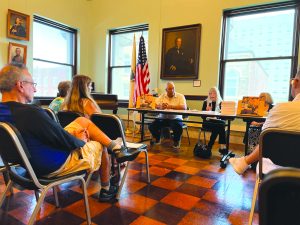Dawn Blake-Souza thinks she may have struck a nerve with her last book.
After publishing a detailed personal history of her family’s heritage and journey from Cape Verde to the U.S. last year, the New Bedford author discovered just how many people want to do the same thing for their own families, but don’t know how to make it happen.
So she did what she does best. She reached out to a few families and created a new book that tells family histories and, at the same time, gives a wider audience a model of the varied ways these stories can be written.
“When I published the last book last year about my Cape Verdean family,” Blake-Souza said. “I had a response from lots and lots of people who indicated that they were interested in telling their family stories. So I started speaking at different events and I had a presentation I created of how to get started telling your stories.”
That led to connecting with individuals who had begun researching their family history and had documentation and notes but didn’t know how to pull it all together.
Blake-Souza was at the New Bedford Public Library in September to celebrate the launch of the resulting book, called “With Little More Than Dreams: Stories of Four Immigrant Families in America.” In it, she works with four immigrant families to trace their lineages, describe cultural traditions, and tell stories important to who they are.
The book became a collaboration between Blake-Souza and the families: husband and wife Dario and Sylvia Miranda’s German- Mexican heritage; Priscilla Pacheco Demers’ Azorean family; Susan Pawlak-Seaman’s Polish-Austrian heritage; and the Cape Verdean history of Blake-Souza’s late husband as researched by his son Paul Souza with consulting assistance from Richard Souza, another family member.
 “A lot of people like Priscilla and Dario and Sylvia, wanted help to tell their stories. They had a lot of stories, but they didn’t know how to go about telling their stories,” she said.
“A lot of people like Priscilla and Dario and Sylvia, wanted help to tell their stories. They had a lot of stories, but they didn’t know how to go about telling their stories,” she said.
“I (also) reached out to people I knew because I wanted to try to get as diverse a group as possible.”
Each person contributed research and documentation from the past as well as personal memories and passed-on stories from family members. In Priscilla Pacheco Demers’ case, Blake-Souza received a binder full of well-researched dates and documents that Demers had worked on for 17 years.
“She had wonderful documentation,” said Blake-Souza.
Pawlak-Seaman’s history was included very close to how the writer contributed it, Blake-Souza said, adding that the journalist and former editor for The Standard-Times also helped edit the book.
“Her story was a little different,” Blake-Souza said. “She couldn’t go back as far but what she did have was very interesting cultural traditions and stories.”
Each family contributor was given full editorial control, a commitment Blake-Souza felt was important when telling other people’s stories. You have to get it right, she said, which made the process more difficult than when she was telling her own family history in her previous book.
“When I did my own it was much easier,” said Blake-Souza. “Doing other people’s families was more difficult because you want to make sure you get it right so you have to keep going back and asking them…It was a lot more involvement.”
“You don’t have to give people the right to say yay or nay, but I felt it was important. And I wanted it told in the way that they felt comfortable with,” she added.
Blake-Souza started the process by giving families an “extensive questionnaire” Questions included ‘What holidays do you remember?’ and ‘Did you have any family traditions questions about religion’ and many others.
“I used that as a starting point,” she said, from which she used documentation and her own research to fill in the stories. was important, she said.
Feedback from Blake-Souza’s first book showed her that family histories don’t just benefit family members. Families gain by hearing about their heritage and having a lasting reminder of it, but so too did many Cape Verdean families scattered around the world who connected with the traditions and culture and, while reading Blake-Souza’s family tales, found themselves remembering their own.
“With Little More than Dreams” is available through usual book channels including Barnes and Noble and Amazon. Blake-Souza is also selling the book directly and giving buyers her discounted price.
Anyone interested in purchasing a copy can email the author at dblakesouza@gmail.com.

Recent Comments